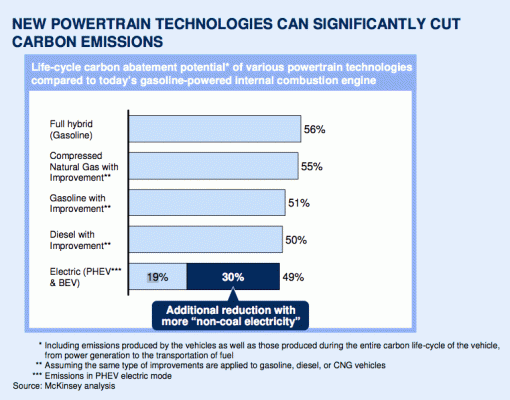I think you would need pretty crazy assumptions to get to higher emissions from EV's than gas vehicles. All of the studies that I have seen have shown a sizable advantage in emissions for EV vehicles.
I had provided this link in previous threads, I didn't have time to dig it up, but here it is now.
The Dirty Truth about Plug-in Hybrids, Made Interactive: Scientific American
and more discussion:
http://www.early-retirement.org/for...myself-to-a-chevy-volt-57855.html#post1142187
So don't argue with me, argue with a pretty respected publication.
Coal may be dirty, but producing electricity in a power plant is a lot more efficient than an internal combustion engine.
But after factoring in transmission, charge losses, and carrying the weight of those batteries, the delta is apparently not great enough to overcome the dirtiness of coal.
Our newer oil supplies are coming more and more from shale oil, which is energy intensive to extract. Converting oil into gasoline is a pretty energy intensive process as well.
Look at the environmental damage from coal TODAY, versus how we get oil. It's ugly, and would make the news like an oil spill except it happens every day of every year, so it's not 'news'.
Note also that the US grid as a whole is now less than half coal powered and dropping. With natural gas prices where they are at, I would expect new coal plants to be extremely rare . Most of our coal plants are baseline power. Any incremental increase in electricity use caused by EV's is less likely to be coal-powered.
Not sure of your assumptions on base line power, but, if EVs make sense in the future, then that is when I will be fan. Why buy one today (for environmental reasons), until there is actually an advantage?
Why do you stereotype and insult a large group of people based on incomplete information?
Sorry if you read it that way. I wasn't meaning to insult anyone, just playing off the earlier comment, and calling a spade a spade. It's pretty silly to really think of a Tesla purchase as doing anything significant for the environment.
First, not everyone who buys a Tesla is doing so for environmental reasons. Some love the performance, many love the technology.
I can understand that. The performance is awesome, the technology is fascinating.
Some like reducing our dependance on oil. Many want to encourage continued research and advances in the EV market.
I question if moving that dependence towards coal is a good thing. We've been through the discussion of pushing advances in EVs before. It's all about the batteries. A few early adopters of EVs won't make a drop in the bucket to the overall advances in battery technology. There is already plenty of push for that from other high volume products.
Second, you use a national average and then apply it to Roadster owners? Are they distributed evenly throughout the US? As I recall, there are about a third outside of the USA, why apply an average of the US electrical grid to overseas owners?
I suspect the highest concentration of Roadster owners are in CA, which has a much cleaner grid.
Yes, I was speaking in generalities. If I didn't, I'd be accused of cherry-picking the data!

Yes, the SciAm article does give a positive score to CA, they have a higher % of hydro and NG.
For those Tesla owners for which the environment IS a high priority, I suspect many have solar or wind power to offset (at a minimum) the power requirements of their ride.
I debunked that in the other thread I linked. Solar or wind could offset the grid or an EV - it's a wash.
Third, the study is using a Prius level of mpg. Those that didn't buy a Tesla for environmental reasons most likely didn't replace a Prius with the Roadster. More likely they bought it instead of some other 0-60 in 3.9s performance vehicle. I would be willing to bet those tend to get 15-20 mpg (or less) rather than the 50mpg of the Prius.
I think the article was trying to be a 'real world' look into the future. The Tesla Roadster is a high performance niche (and very cool) product. It would never make up enough of the market to affect environmental issues. The study was trying to look at some hypothetical point when 'regular' people would have a competitive choice between a high mpg hybrid, and an EV.
Please note, I am not saying there isn't ANYONE who is a, in your terms, faux-greenster that bought one to show off (I am sure there are one or two). But your wide brush is insulting
Again, didn't mean to insult. I do think it is silly to claim the Tesla makes a 'green' statement. If a hobbyist wants to buy one for the performance and the technology, more power (KWHrs?) to him/her. Just don't lay no 'green' talk on me, I'm not buying it.
-ERD50


 YMMV
YMMV